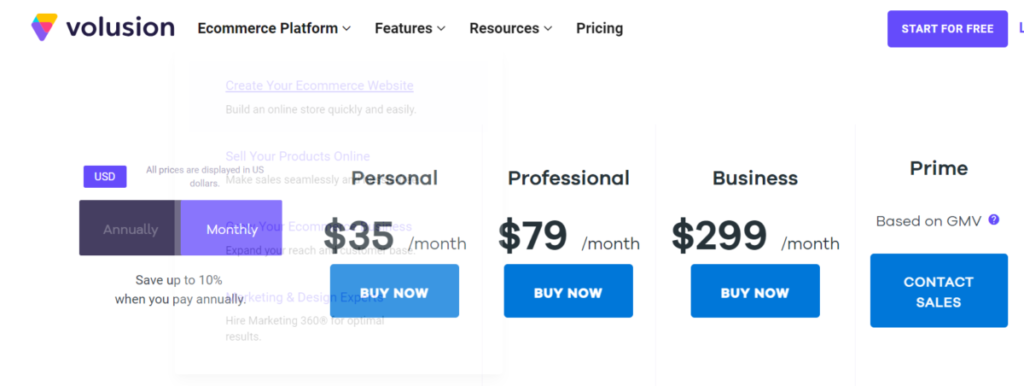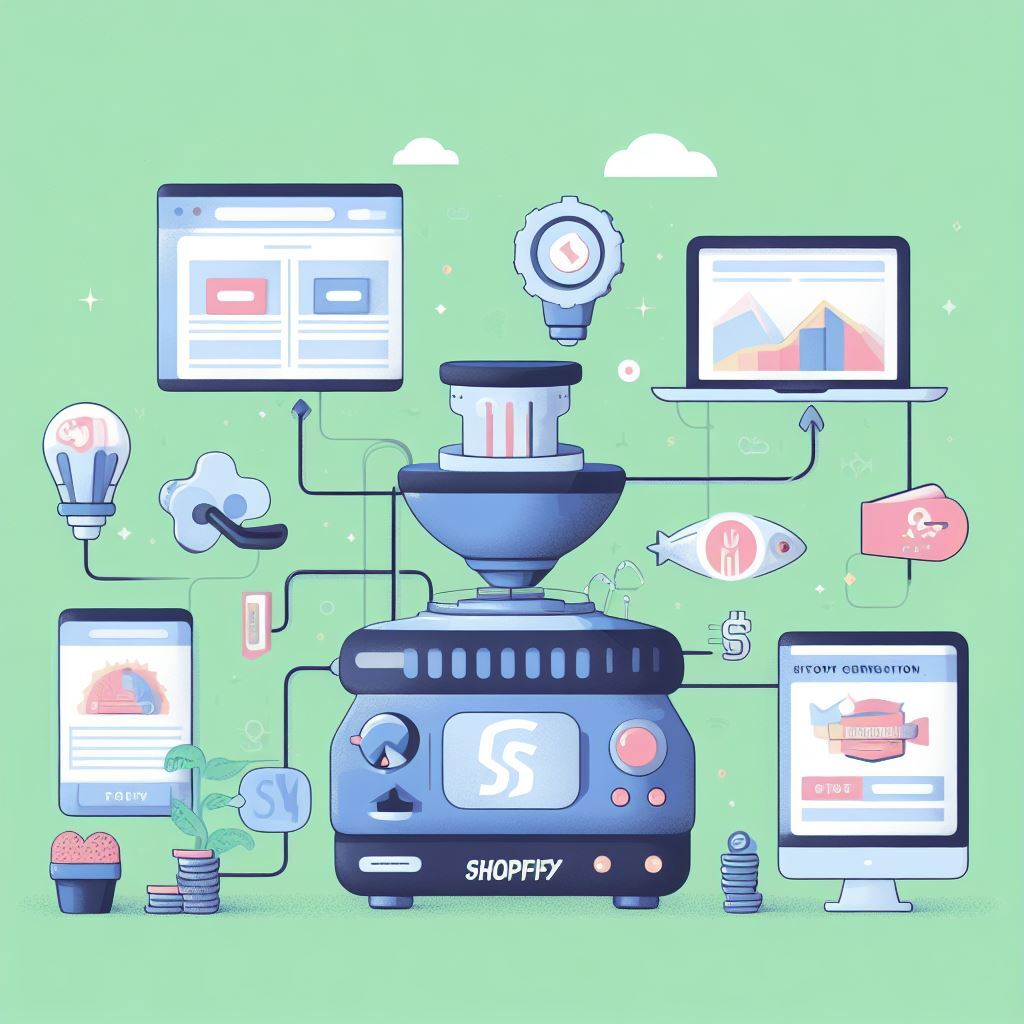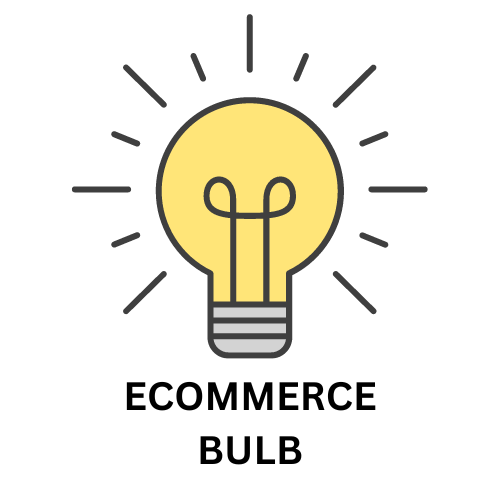
Volusion Vs. Shopify? Which is Better eCommerce Platform?
In order to decide which ecommerce platform to use, Shopify vs. Volusion. There are many factors that you have to take into consideration. If you want to decide which eCommerce platform to choose, there are many things to consider.
These are some examples of these factors:
- Cost.
- SEO friendliness.
- Page load speed.
- Canonical website URL.
- Indexing Control.
- Customizable HTML capabilities.
- Sitemap Generator.
- Integration with Google Analytics.
- Product Tagging and Categorization.
- Batch Uploading.
- Mobile Optimization.
- Built-in Blogging and Marketing Features.
- Social Sharing Buttons.
- Content Management Capabilities.
- Discount and promotion code tools.
- Easy to use Checkout.
- Reporting tools and custom reports.
- Integration of email marketing tools.
- Multiple payment options.
- Flexibility to add new eCommerce features.
- Exclusive features.
- Cons and pros.
Pricing (Shopify Vs. Volusion):
Shopify’s Pricing:

In Shopify, the price starts from $32 for the basic plan and goes up to (The Advanced Plan) with a price tag of $399.
Do not forget that, in Shopify, you’ll need to buy apps, themes, and designs. You might also need to purchase some services like a domain name and -in some cases- web hosting services.
Volusion’s Pricing:

Volusion offers four pricing packages for its ecommerce platform:
1. Personal: $35 per month. This plan includes 100 products, one staff account, and online support.
2. Professional: $79 per month. This plan includes 5,000 products, five staff accounts, and online support.
3. Business: $299 per month. This plan includes unlimited products, 15 staff accounts, & online and call-in support.
4. Prime: Custom pricing based on online sales. This plan includes unlimited products & staff accounts and a dedicated customer service manager.
All plans include premium checkout features, industry-leading payment solutions, free modern mobile-friendly themes, unlimited bandwidth, SSL certificate included, and more.
Customers who use an alternative supported payment gateway are subject to Gateway Maintenance Fees per transaction of 1.25% for Personal Plans, 0.65% for Professional Plans, 0.35% for Business Plans, and custom percentages for Prime Plans.
You can save up to 10% on all plans if you pay annually.
SEO Capabilities (Shopify Vs. Volusion):

Shopify’s SEO Capabilities:
Shopify offers built-in SEO features to optimize your website for search engines. Here are some of the key capabilities:
1. Automatic Sitemaps and XML Sitemaps: Shopify automatically generates sitemaps for your store, making it easier for search engines to crawl and index your site.
2. URL Structure Editing: You can edit your eCommerce Store URL structure, which can help improve SEO.
3. URL Optimization: Shopify allows URL optimization to enhance eCommerce store visibility in search engine results.
4. Meta Tags Support: You can add meta tags to your store’s content to improve your site’s purpose in search engine results.
5. Canonical Tags: Shopify uses canonical tags to prevent duplicate content from negatively impacting an online store’s SEO.
6. SSL Certification: Shopify provides SSL certification for all stores, which can improve a website’s ranking in search results.
7. Structured Data: Shopify supports structured data, making it easier for search engines to understand the content on your site.
8. Mobile Friendly: Shopify themes are mobile-friendly, a factor that search engines consider when ranking sites.
In addition to these built-in features, Shopify offers SEO Manager, a handy app that helps optimize your website for search engines. It provides features like meta tags, structured data, and even a Google PageSpeed Insights score.
Volusion’s SEO Capabilities:
Volusion offers a variety of SEO features to help optimize your online store for search engines:
1. SEO Page: Volusion has simplified the process with the SEO panel located within your Admin Area. With a few mouse clicks, your store is SEO-ready for indexing by all major search engines based on the data, URLs, and content.
2. Meta Tag Information: You can configure meta tags for your store. Meta tags are specialized HTML tags that contain information about the contents of a website or webpage and describe the data on it.
3. Default Values: You can set up to three meta tag fields for each active server page. You can fill in the fields to populate metadata for every page with blank SEO fields.
4. Advanced Users: If you’re an advanced SEO expert, you may consider overriding the default meta tags with HTML coding to create custom meta information for specific SEO purposes.
In addition to these built-in features, Volusion also provides a comprehensive SEO checklist for new stores. It includes technical SEO performance, on-page SEO, and off-page SEO. These tactics can help ensure your website is visible to potential customers.
Which has Better SEO Capabilities, Shopify Vs. Volusion?
Overall, Shopify has better SEO capabilities than Volusion. Shopify offers a wide range of SEO features and apps, and it is easier to use these features and apps to optimize your website for search engines.
Read More: Why Shopify is a Better eCommerce Platform than SquareSpace?
PageLoad Speed (Shopify Vs. Volusion):

Shopify’s Pageload Speed:
Shopify provides several tools and techniques to optimize the page load speed of your online store:
1.Automatic Sitemaps and XML Sitemaps: Shopify automatically generates sitemaps for your store, making it easier for search engines to crawl and index your site.
2. URL Structure Editing: You can edit your store’s URL structure, which can help improve SEO.
3. URL Optimization: Shopify allows URL-optimized visibility enhancement in search engine results.
4. Meta Tags Support: You can add meta tags to your store’s content to improve how your website shows in search engine results.
5. Canonical Tags: Shopify uses canonical tags to prevent duplicate content from negatively impacting an eCommerce website’s SEO.
6. SSL Certification: Shopify provides SSL certification for all stores, which can improve a website’s ranking in search results.
7. Structured Data: Shopify supports structured data, making it easier for search engines to understand the content on your site.
8. Mobile Friendly: Shopify themes are mobile-friendly, a factor that search engines consider when ranking sites.
Volusion’s PageLoad Speed:
*VOLT is Volusion's new flexible, scalable ecommerce platform built on a framework we call Element. VOLT solves the limitations of modern online stores by offering the fastest sites available built for the mobile-first index, improving organic search rankings, and increasing conversions.
Volusion has made significant efforts to optimize the page load speed of its online stores:
1. Google PageSpeed Insights Scores: Volusion’s VOLT* Stores score in the 90-100 range on PageSpeed testing. This score is within the green range, where you want to stay for search engine optimization (SEO).
2. Fast Page Loading Speed: To help you rank highest on Google and other search engines, VOLT has lightning-fast page loading speed.
3. Google AMP Pages: Google AMP pages (also built-in to VOLT) are an even faster version of your VOLT Store that will appear on Google search on mobile devices.
4. Third-Party Scripts: The VOLT Store does not reference third-party scripts by default. When building custom Blocks, you must avoid using third-party scripts, when possible, as they can slow down your website significantly.
Which eCommerce Platform has better PageLoad Speed, Shopify Vs. Volusion?
Shopify has a better page load speed than Volusion. According to Pingdom, page load speed of Shopify averages around 2.13 seconds, while the average page load speed for Volusion is 3.35 seconds.
Canonical Website URL (Volusion Vs. Shopify):

Shopify’s Canonical Website URL Capabilities:
Shopify uses the main site/product/item URL as the canonical.
Yet, you can create a canonical URL in Shopify. By adding the link tag with rel=“canonical” attribute to the head of your theme’s HTML code, you can do it in an instant
Volusion’s Canonical Website URL Capabilities:
Volusion provides several capabilities for handling canonical URLs, which are crucial for SEO:
1. Canonical Attribute.
2. Use Cases.
3. HTML Tag.
4. SEO Page.
5. Meta Tag Information.
These features help prevent issues with duplicate content and ensure that search engines index your site correctly, improving your site’s visibility in search results.
Which eCommerce Platform has Better Canonical Website URL Capabilities, Shopify Vs. Volusion?
Shopify has better canonical website URL capabilities than Volusion.
Shopify makes it easy to set canonical URLs for your pages. You can do this by editing the canonical tag in the HTML section of your web pages. You can also use Shopify’s canonical URL app to set canonical URLs on autopilot.
Indexing Control (Shopify Vs. Volusion):

Volusion’s Indexing Control:
Volusion provides several features to control the indexing of your site by search engines. Here are some key points:
1. Sitemap: The Volusion store’s sitemap is at www.yourecomstore.com/sitemap.xml. Volusion automatically generates your sitemap every 24 hours.
If you’ve recently restructured your site by adding or removing pages and want the most updated version of your site immediately, you can regenerate the sitemap manually by navigating to Marketing>>SEO, & then scrolling to the bottom of the page to Sitemap.
2. Robots.txt file: You should add your sitemap’s location to your Robots.txt file, editable under Marketing>>SEO.
3. Meta Tag Information: Meta tags are specialized HTML tags that contain information about the contents of a website or webpage and describe the data on it. Meta tag content is specifically for the benefit of search engines & is invisible to your customers. To configure your SEO settings, go to Marketing > SEO in your Admin Area.
Remember, these are just a few ways to control how search engines index your site. For more detailed information, you may want to refer to Volusion’s guide on understanding sitemaps and page indexing or their article on SEO features.
Shopify’s Indexing Control:
Shopify provides several features to control the indexing of your site by search engines. Here are some key points:
1. Algolia Search and Discovery App: The Algolia Search and Discovery app uses the Shopify API and webhooks To index your data. When you install the app in your store, it starts indexing your data (Full reindex).
2. Automatic Updates: It uses Shopify webhooks to know when you update your Shopify catalogue and immediately push the changes.
3. Indexing Jobs: The app uses an indexing queue to index your data while keeping it consistent & abiding by Shopify’s rate limiting. All your indexing jobs wait until they can be processed. You can see the number of queued indexing jobs in the Indexing tab of the app.
4. Password Protection: To prevent your store from being indexed on any search engine, you can enable password protection. Shopify will add all URLs in private mode, and Google cannot crawl your website.
Is Shopify better than Volusion in Indexing Control?
Pick Shopify if you prefer a more automated approach and need features like an indexing queue.
Pick Volusion if you want more control over SEO settings & to regenerate your sitemap manually.
Customizable HTML Capabilities (Shopify Vs. Volusion):

Is Volusion Any Good in Customizable HTML Capabilities than Shopify?
Shopify and Volusion offer customizable HTML capabilities, but the better choice depends on your specific needs and preferences.
Shopify:
– Shopify allows users to add custom HTML to their website.
– You can easily customize themes with HTML, CSS, JavaScript, JSON, and Liquid, Shopify’s open-source markup language.
– Shopify does not allow custom HTML in their themes.
– You can add a custom HTML section to your Shopify store.
– Shopify uses the Algolia Search and Discovery app for indexing.
Volusion:
– Volusion allows you to create page-specific CSS style or HTML code.
– You can add some JavaScript into your template_###.htm file (via the Design > File Editor page), typically on a new line immediately following the <body> tag.
– If you make any changes to your theme, always make a backup copy of the original theme file before attempting any programming change (HTML, JavaScript, CSS, etc.) if you need to revert to a previous version.
– Volusion’s Site Designer allows you to customize your store by selecting from their regularly updated gallery of blocks.
In summary, if you prefer a more automated approach and need features like an indexing queue, Shopify is the choice. On the other hand, if you want more control over SEO settings and the ability to regenerate your sitemap manually, Volusion could be more suitable. It’s best to consider the specific needs of your online store before making a decision.
Sitemap Generators (Shopify Vs. Volusion):

Is Shopify Better Than Volusion in Sitemap Generators?
Shopify is known to have better sitemap generators than Volusion. Shopify’s sitemap generator is easier to use and produces more comprehensive sitemaps.
Shopify’s sitemap generator is automatically enabled and generates a sitemap for your entire website, including your product pages, collection pages, and blog posts. You can also create a sitemap for a specific page or section of your website.
Volusion’s sitemap generator is not automatically enabled & they’re readily configurable from the control panel. Once you have configured Volusion’s sitemap generator, it will generate a sitemap for your website’s product pages, collection pages, and blog posts. However, Volusion’s sitemap generator will not create a sitemap for other pages on your website, such as your homepage and contact page.
Integration With Google Analytics (Shopify Vs. Volusion):

Is Shopify Better Than Volusion in Integration with Google Analytics?
Shopify has a better integration with Google Analytics than Volusion.
Shopify offers several features that make it easy to integrate your Shopify store with Google Analytics, including:
- Automatic integration: Shopify automatically integrates with Google Analytics, so you don’t need to do any manual setup.
- Comprehensive tracking: Shopify tracks a wide range of data, including product views, cart additions, and purchases. This data can be sent to Google Analytics for analysis.
- Customizable reports: Shopify offers several customizable reports that can help you analyze your Google Analytics data.
- Third-party integrations: There are a number of third-party apps available that can help you to further integrate your Shopify store with Google Analytics.
Volusion also offers integration with Google Analytics, but the integration is not as comprehensive as Shopify’s. For example, Volusion does not automatically track as wide a range of data as Shopify, and Volusion does not offer as many customizable reports as Shopify.
Product Tagging and Categorization (Shopify Vs. Volusion):

Is Shopify Better Than Volusion in Product Tagging & Categorization?
Shopify is considered to have better product tagging and categorization features than Volusion. Shopify offers a wider range of features and more flexibility for tagging and categorizing products.
Here is a table that compares Shopify and Volusion’s product tagging and categorization features:
| Feature | Shopify | Volusion |
|---|---|---|
| Number of product tags | Unlimited | Limited |
| Product tag hierarchy | Yes | No |
| Product categorization | Yes | Yes |
| Product category hierarchy | Yes | No |
| Product tag and category suggestions | Yes | No |
| Third-party integrations | More | Less |
Batch Uploading (Volusion Vs. Shopify):

Is Volusion Better than Shopify in Batch Uploading?
No, Shopify has a better batch-uploading feature than Volusion. Shopify offers several features and integrations that make it easier to batch-upload products, variants, categories, images, and other data. Here is a comparison table between Shopify & Volusion:
| Feature | Shopify | Volusion |
|---|---|---|
| Batch product uploading | Yes | Yes |
| Batch variant uploading | Yes | Yes |
| Batch category uploading | Yes | Yes |
| Batch image uploading | Yes | Yes |
| Batch tag uploading | Yes | No |
| Batch CSV file importing | Yes | Yes |
| Third-party integrations | More | Less |
Mobile Optimization (Shopify Vs. Volusion):

Is Shopify Better than Volusion in Mobile Optimization?
Shopify is a better platform for mobile-friendly websites.
Because Shopify offers many features to improve the mobile experience, such as:
- Accelerated Mobile Pages (AMP): AMP is a technology that makes web pages load faster on mobile devices.
- Shopify generates AMP versions of all your pages, which can help to improve your website’s mobile loading speed.
- Responsive design: Shopify websites are all responsive by default, the display will adjust to fit the screen size of the device. It ensures that the website looks good and functions well on all devices, including smartphones and tablets.
- Mobile app: Shopify offers a mobile app to manage your store from your phone or tablet. It is vital to make changes to your store on the go or to fulfil orders while away from your computer.
Volusion’s Mobile Optimization:
- Volusion’s mobile themes are a little more basic than Shopify’s, but they are still responsive and easy to use.
- Volusion’s mobile editor isn’t as powerful as Shopify’s, but it is still sufficient to change the store’s appearance.
- Volusion does not offer as many mobile-specific features as Shopify. It provides some features, such as the ability to hide certain elements on mobile devices and optimize shipping rates for mobile users.
Built-in Blogging & Marketing Features (Volusion Vs. Shopify):

Is Shopify Better than Volusion in Built-in Blogging & Marketing Features?
Blogging Features:
- Shopify: Shopify has a built-in blogging platform that is easy to use and feature-rich. You can create blog posts, schedule them to be published later, and add images, videos, and other multimedia. Shopify also offers a variety of blogging templates to choose from, and you can customize your blog’s appearance to match your store’s branding.
- Volusion: Volusion does not have a built-in blogging platform. However, you can use a third-party blogging service and integrate it with your Volusion store. It can be more time-consuming and less efficient than using a built-in blogging platform.
Marketing Features:
- Shopify: Shopify offers many marketing features, including email marketing, social media marketing, and search engine optimization (SEO). You can use Shopify’s built-in email marketing tool to create and send email campaigns to your subscribers. You can also use Shopify’s social media apps to connect your store to your social media accounts and share your products and promotions with your followers. Shopify also has several SEO features to help you improve your store’s ranking in search engine results.
- Volusion: Volusion offers a limited number of marketing features. It has a built-in email marketing tool, but it is not as user-friendly or feature rich as Shopify’s email marketing tool. Volusion also has a few social media apps, but they are not as well-integrated with Volusion’s platform as Shopify’s social media apps. Volusion also has a few SEO features, but they are not as comprehensive as Shopify’s SEO features.
Overall, Shopify is the better choice for businesses interested in blogging and marketing. Its built-in blogging platform and wide range of marketing features make it a more versatile and user-friendly platform for creating and managing a successful blog and marketing campaign.
Social Sharing Buttons Availability (Volusion Vs. Shopify):

Is Shopify Better than Volusion in Social Media Sharing Buttons Avalability?
Short answer is YES!
- Shopify offers a wide variety of social sharing buttons. It means that you can choose to share your products and promotions on a wide range of social media platforms.
- Shopify’s social sharing buttons are more customizable than Volusion’s. It means that buttons are customizable to match your store’s branding.
- Shopify offers several social sharing widgets that you can add to your store, such as a social sharing bar and a social sharing button fly-out. These widgets can help you increase the visibility of your social sharing buttons and encourage your visitors to share your products and promotions with their friends and followers.
Content Management Capabilities (Volusion Vs. Shopify):

Is Volusion Better than Shopify in Content Management Capabilities?
The short answer is NO.
Shopify is considered the better choice for content management due to its more user-friendly interface, wider variety of pre-built templates and themes, and more comprehensive SEO tools. Volusion is still a viable option, but it may require more effort to learn and use its content management features effectively.
Shopify’s Content Management Capabilities:
- A WYSIWYG: (What You See Is What You Get) editor for creating and editing product descriptions, blog posts, and other content.
- Many templates and themes to choose from: It can be customized to match your store’s branding.
- The ability to add images, videos, and other multimedia to your content.
- A built-in blog platform for creating and publishing blog posts.
- A variety of SEO tools to help you improve your store’s ranking in search engine results pages (SERPs).
- Ease of Use is better than Volusion.
Volusion’s Content Management Capabilities:
- A WYSIWYG: (What You See Is What You Get) editor for creating and editing product descriptions, blog posts, and other content.
- Fewer templates and themes to choose from: It can be customized to match your store’s branding.
- The ability to add images, videos, and other multimedia to your content.
- A built-in blog platform for creating and publishing blog posts.
- A variety of SEO tools to help you improve your store’s ranking in search engine results pages (SERPs).
- Volusion is considered to be more difficult to use than Shopify.
Discounts & Promotion Codes (Volusion Vs. Shopify):

Is Shopify Better than Volusion in Discounts & Promo Codes Capabilities?
Yes, Shopify is known for its wide range of discounts and promotion codes, including:
- Percentage off discounts: These discounts apply to specific products, categories, or your entire order.
- Free shipping discounts: They’re discounts that apply to orders over a certain amount or to specific products or categories.
- Buy one, get one (BOGO) discounts: These discounts allow you to get one item for free when you purchase two.
- Gift card discounts: These discounts allow you to purchase gift cards at a discounted price.
Shopify also offers a variety of ways to apply discounts and promotion codes, including:
- Entering a code at checkout: This is the most common way to apply a discount or promotion code.
- Using a discount link: This link will apply the discount to your order when you click on it.
- Adding a discount code to your cart: This discount works by entering the code in the “Discount code” field at checkout.
- Wider range of discounts and promos.
- Discounts & Promos are easier to find, use & apply.
Volusion also offers a variety of discounts and promotion codes, including:
- Percentage off discounts: These discounts apply to specific products, categories, or your entire order.
- Free shipping discounts: Discounts are active to orders over a certain amount or to specific product or category.
- BOGO discounts: These discounts allow you to get one item for free when you purchase another item.
- Gift card discounts: These discounts enables purchasing gift cards at a discounted price.
Volusion also offers a variety of ways to apply discounts and promotion codes, including:
- Entering a code at checkout: This is the most common way to apply a discount or promotion code.
- Using a discount link: This link will apply the discount to your order when you click on it.
- Adding a discount code to your cart: This discount applies by entering the code in the “Discount code” field at checkout.
Easy to Use Checkout (Shopify Vs. Volusion):

Is Shopify Better than Volusion in Easy-to-Checkout Capabilities?
Overall, Shopify is the better choice for ease of use of a checkout process. Its single-page checkout is more streamlined and user-friendly & it offers more comprehensive customization options. Volusion’s checkout process is also user-friendly, but it may not be as intuitive for some users, and it offers fewer customization options.
Reporting Tools and Custom Reports (Shopify Vs.Volusion):

Is Shopify Better than Volusion in Reporting Tools & Custom Reports?
Shopify is considered the better choice for reporting tools and custom reports. Its wide range of pre-built reports, drag-and-drop report builder, and Reporting API make it more versatile and user-friendly for creating the reports you need to track and analyze your store’s performance. Volusion’s reporting tools are functional, but they may not be as comprehensive or user-friendly as Shopify’s.
Integration of Email Marketing Tools (Shopify Vs. Volusion):

Shopify’s Integration with Email Marketing Tools:
Shopify offers seamless integration with various email marketing tools to help you effectively engage with your customers. Here are some popular email marketing tools to integrate with Shopify:
- Mailchimp: One of the most widely used email marketing platforms, Mailchimp offers a user-friendly interface and advanced features like audience segmentation and automation.
- Klaviyo: A powerful email marketing tool specifically designed for ecommerce businesses. It enables targeted campaigns based on customer behaviour and purchase history.
- Constant Contact: Ideal for small businesses, Constant Contact provides easy-to-use email templates and automation tools to create professional-looking emails.
- HubSpot: A comprehensive marketing platform that includes email marketing capabilities. It offers advanced segmentation, personalization, and automation features.
- Omnisend: A platform specifically designed for ecommerce businesses, Omnisend provides pre-built email templates, automated workflows, and integrations with multiple marketing channels.
To integrate these tools with Shopify, you can visit the Shopify App Store and search for the specific email marketing tool you want to use. From there, you can install the app and follow the steps to connect it with your Shopify store.
Remember to review the features and pricing of each tool to decide which one suits your business needs best.
Volusion’s Integration with Email Marketing Tools:
Volusion supports integration with many popular email marketing tools, including Mailchimp, Klaviyo, Constant Contact, and HubSpot. These integrations allow you to connect your Volusion store with your email marketing campaigns and effectively manage your customer data.
Which is Better? Shopify or Volusion in Email Marketing Tools Integration?
Shopify is considered the better choice for the integration of email marketing tools. Its wide range of direct integrations, straightforward integration process, and automatic customer data synchronization make it more user-friendly and efficient for connecting your store with your email marketing efforts. Volusion’s integration capabilities are powerful, but they may require more technical expertise and manual setup compared to Shopify.
Multiple Payment Options (Volusion Vs. Shopify):

Does Shopify Offer More Payment Options than Volusion?
Yes, Shopify offers a wide range of payment options, more than that of Volusion, including:
- Credit and debit cards: Accept payments from all major credit and debit cards, including Visa, Mastercard, American Express, and Discover.
- Digital wallets: Accept payments from popular digital wallets, such as PayPal, Apple Pay, and Google Pay.
- Buy now, pay later (BNPL): Offer BNPL options, such as Affirm and Klarna, to allow customers to split their purchases into instalments.
- Bank transfers: Accept bank transfers from customers who prefer this payment method.
- Cash on delivery (COD): Offer COD for customers who prefer to pay in cash upon delivery.
Shopify also allows you to connect with multiple payment gateways, providing flexibility in choosing the payment providers that best suit your business needs and customer preferences.
Flexibility to Add New eCommerce Features (Volusion Vs. Shopify):

Do Shopify Have Better Capabilites to Add New eCommerce Features than Volusion?
Shopify is considered the better choice for flexibility to add new eCommerce features. Its extensive app ecosystem, ease of adding apps, and wide range of built-in features make it more versatile and adaptable for adding new features and functionalities to your store. Volusion is powerful, but its base of developers and testers is less & the addon base may not be as comprehensive as Shopify’s.
Exclusive Features (Volusion Vs. Shopify):

Shopify’s Exclusive Features:
- Abandoned cart recovery: Shopify allows you to send abandoned cart emails to customers who have abandoned their carts. This can help you to recover lost sales.
- Purchase funnel analytics: Shopify provides you with detailed analytics about your purchase funnel. This information can help you to improve your conversion rate.
- Shopify POS: Shopify POS (point of sale) allows you to sell your products and services in person. This is a great option for businesses that have both an online and offline presence.
- Third-party commerce integrations: Shopify integrates with a variety of third-party commerce platforms, such as Amazon and eBay. This allows you to sell your products on multiple channels.
Volusion’s Exclusive Featrues:
- Unlimited bandwidth and storage: Volusion does not limit the amount of bandwidth or storage that you use. You can upload as many products and images as you need, and you will not have to worry about your website slowing down or crashing due to excessive traffic.
- Built-in marketing tools: Volusion includes many built-in marketing tools to help you promote your business. These tools include email marketing, social media marketing, & search engine optimization (SEO).
- Secure payment processing: Volusion uses many security measures to protect customers’ payment information. These measures include 128-bit SSL encryption, PCI compliance, and fraud prevention tools.
- Mobile-friendly themes: Volusion offers a variety of mobile-friendly themes that look great on any device. Your customers will be able to shop from their smartphones or tablets.
- 24/7 customer support: Volusion offers 24/7 customer support to help you with any questions or problems that you may have. You can contact customer support via phone, email, or live chat.
Market Share (Volusion Vs. Shopify):

Shopify’s Market Share:
- Shopify is one of the most preferred ecommerce platforms.
- It has over 4.3 million live sites, grabbing a market share of 10.32% worldwide.
- In the U.S. alone, Shopify has a 23 per cent market share.
- Shopify currently has the largest eCommerce platform market share in the USA, with nearly one in three (28%) online businesses using it to power their stores.
- As for GMV (Gross Merchandize Value), Shopify claims a 10.3% market share in the U.S.
Volusion’s Market Share:
- Volusion has a market share of about 0.27% compared to leading competitors WooCommerce, Shopify and Ecwid.
- Volusion has a market share of 0.20% in the ecommerce platform market.
- In the shopping cart software market, Volusion has a market share of 3.39%.
CONS Of Volusion Vs. Shopify:

Cons of Shopify:
- Limited customization.
- Transaction fees.
- App costs.
- Limited support for B2B commerce.
Cons of Volusion:
- No Blogging Option.
- Limited Design Tools & Features.
- Cannot Sell Digital Products.
- Slower Load Times.
- Limited Integrations with Third-Party Apps.
- Small Community.
- Rough Learning Curve.
- Limited Customization Options.
BuiltWith.com Data (Volusion Vs. Shopify):

As of November 2023, more than 4.7 million website use Shopify as eCommerce platform according to Builtwith.com, while more than 17 thousand eCommerce website use Volusion technology.
Hidden Charges & Fees (Volusion Vs. Shopify):

Shopify’s Hidden Charges & Fees:
Unless you use Shopify Payments, which is the payment gateway of Shopify, they’ll charge transaction fees when utilizing other payment gateways.
Transaction costs range from 0.5% to 2%. Shopify Payments is only available in a few countries and regions, and the fees range from 2.4% to 2.9% + 30 cents for each transaction.
Shopify has a huge and diverse app store with over 6,000 apps that can assist you in adding and improving various features for your online business. Many apps are not free and may impose monthly subscriptions, one-time payments, or usage-based costs. Some applications may need you to upgrade your Shopify plan to use their features.
Shopify has plans ranging from $29 to $299/month to meet demands and budgets. The cost reflects the annual payments. If you pay monthly, you will pay more. The Basic Shopify package, for example, costs $29 per month if paid annually, but $35 per month if paid monthly.
Volusion’s Hidden Charges & Fees:
- Transaction Fees: Volusion does not charge transaction fees on their plans. However, the payment gateways you choose for payment processing may charge them.
- Bandwidth Charges: There have been complaints about Volusion’s bandwidth charges. It’s good to understand how much bandwidth your store will need and factor this into your costs.
- Hidden Costs: Volusion’s pricing structure may mask some hidden costs. These are things that competitors might include for free. It’s crucial to understand what is & isn’t included in each Volusion plan.
- Automatic Upgrade: Like its main competitor BigCommerce, Volusion forces you to upgrade your plan if your sales revenues exceed a certain limit in any given year. The difference in price between your plan and the automatic upgrade could be significant.
- Additional Costs: There may be additional costs for features or services. For example, Volusion offers a range of premium themes that can be expensive.
Conclusion (Comparison Table for Volusion Vs. Shopify):
| eCommerce Platform | Shopify | Volusion |
|---|---|---|
| Price | 7 | 6.5 |
| SEO Friendliness | 7.5 | 7.3 |
| Page Load Speed | 8.5 | 8.4 |
| Canonical Website URL | 9 | 8.5 |
| Indexing Control | 8.5 | 8.5 |
| Customizable HTML capabilities | 9 | 9 |
| Sitemap Generator | 9 | 8.2 |
| Integration With Google Analytics | 7.5 | 7.2 |
| Product Tagging & Categorization | 6.5 | 6 |
| Batch Uploading | 7 | 6.5 |
| Mobile Optimization | 9 | 8 |
| Built-in Blogging & Marketing Features | 7 | 4 |
| Social Sharing Buttons | 9 | 6 |
| Content Management Capabilities | 8 | 7.5 |
| Discount & Promo Code Tools | 9 | 7.7 |
| Easy to Use Checkout | 9.5 | 7 |
| Reporting Tools & Custom Reports | 8.5 | 6 |
| Integration of Email Marketing Tools | 9 | 7.9 |
| Multiple Payment Options | 9 | 6 |
| Flexibility to Add New eCommerce Features | 9 | 6.3 |
| Exclusive Features | 9 | 8.8 |
| Market Share | 9.5 | 7 |
| CONS & PROS | 8 | 6 |
| Builtwith.com Data Index | 9.5 | 6.1 |
| Hidden Fees & Charges | 7.5 | 6.2 |
| Overall Assessment (Average) | 8.4 | 7.064 |


Leave a Reply